China Memes & Viral
Chinese Math Schoolbook Gate Continues
Why Weibo is focused on these elementary math schoolbooks.
Published
4 years agoon
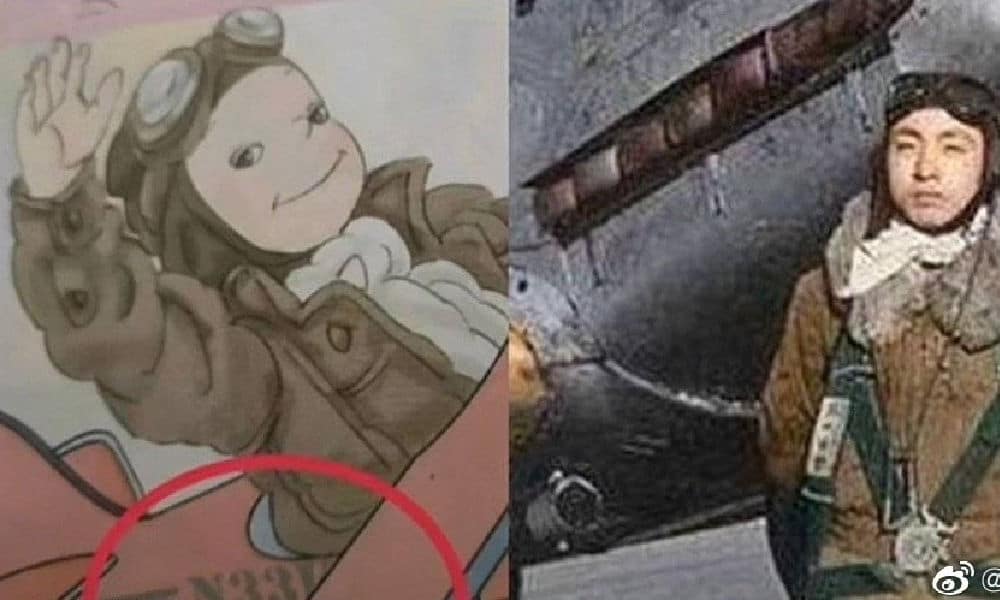
A Chinese schoolbook series that was published nearly a decade ago continues to be one of the most talked-about subjects on Chinese social media this week.
The elementary schoolbook series (covering grade 1-6) went trending after some parents posted that they were concerned about the contents of the book, triggering major controversy on Weibo and beyond. The hashtag “PEP Math Teaching Material” (#人教版数学教材#) had received 570 million views on Weibo by Friday evening, the hashtag “PEP Math Textbook Illustrations Trigger Controversy” (#人教版数学教材插图引争议#) attracted over 290 million views.
People mainly took issue with the teaching material because they thought the illustrations were ugly, unrefined, and overall weird (read our previous article here).
But besides the quality of the design, many people also found that some illustrations were really inappropriate. There was a girl sticking out her tongue; recurring depictions of the American flag colors; an incorrect depiction of the Chinese flag; a bulge showing in the pants of the depicted boys; a girl in a bunny outfit, and more.
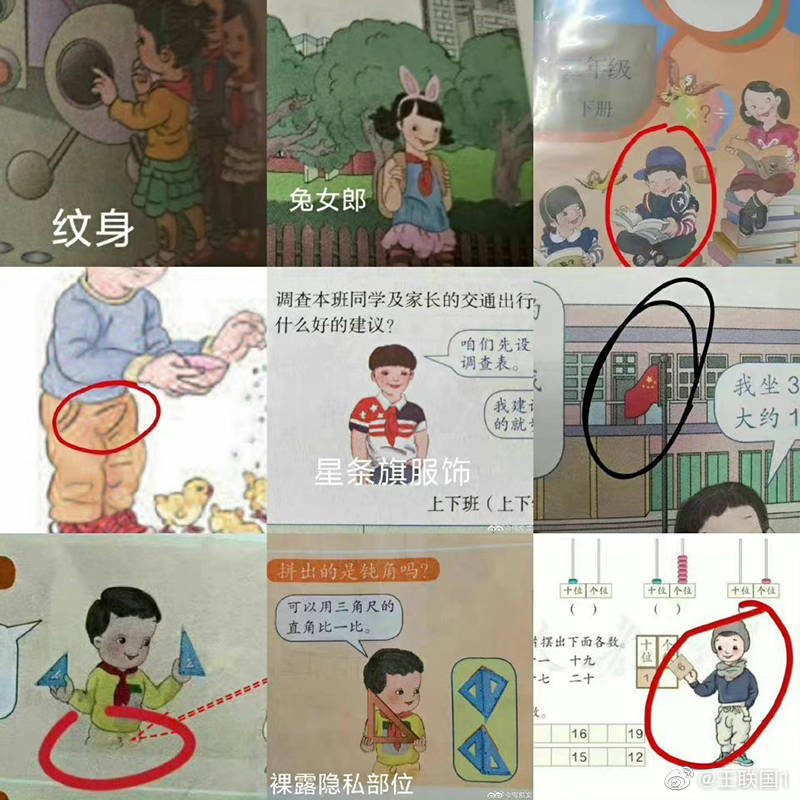

Some internet users pointed out that there were more American references in the illustrations: a boy wearing a cap with the word ‘Tame’ on it, and another one with a t-shirt that says ‘CAPT’ (written abbreviation for captain).
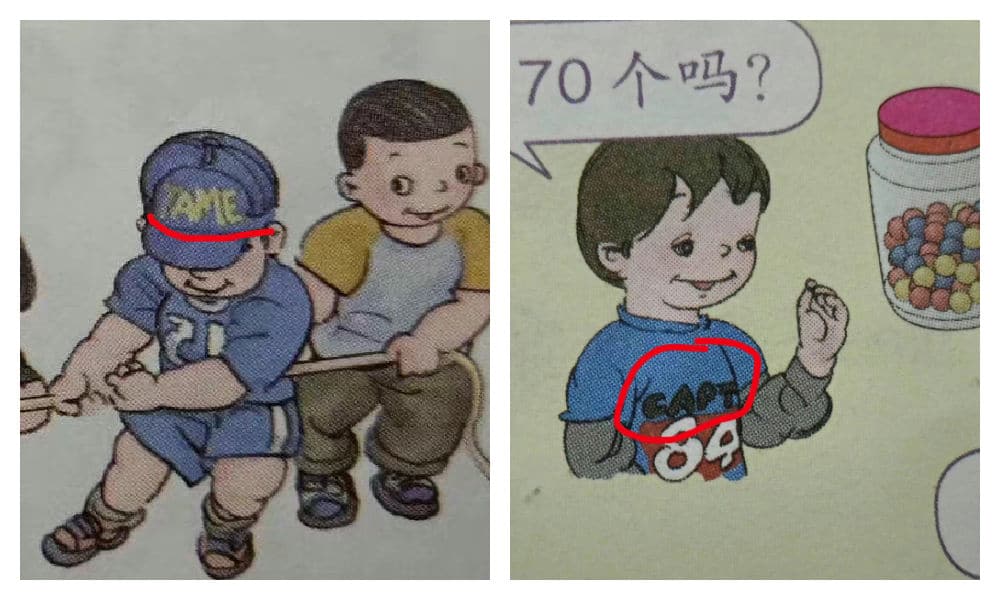
There were also people who posted an image from the teaching material showing a little pilot in a plane that had ‘N33’ written on it. While the plane seems to be modeled after an American aircraft, the pilot’s clothing resembles that of Japanese pilots during WWII.
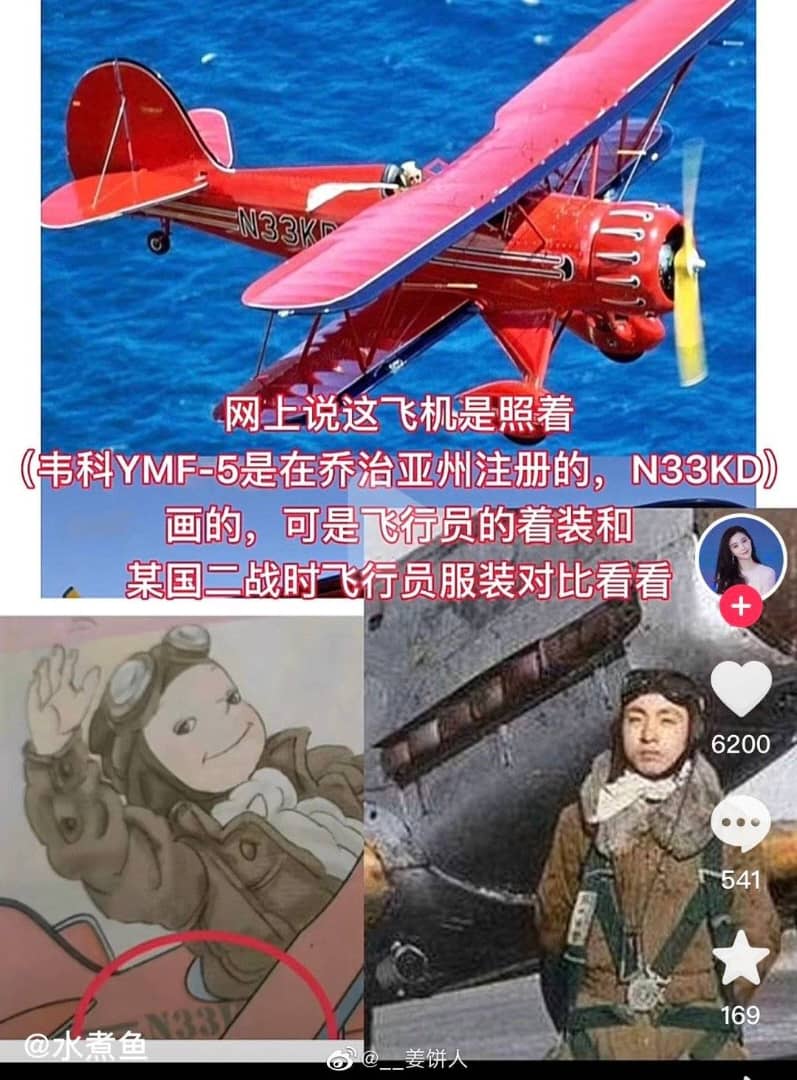
These findings led more people to believe that the book series is more than just ugly; it is manipulative and designed with the alleged intent to insult the Chinese people. The depiction of children with eyes wide apart, looking somewhat eccentric, is also assumed to be part of this attempt to smear China.
Who would make and approve such a book, netizens wondered. The answer was surprising to many: the book was approved in 2012 and published in 2013 by the renowned People’s Education Press (PEP) and designed by Beijing Wu Yong Design Studio – designer Wu Yong allegedly graduated from the prestigious Academy of Arts of Tsinghua University.
The People’s Education Press responded to the controversy on Weibo on May 26, stating it would listen to criticism and review the illustrations of their elementary school maths textbooks.
But that reaction, despite receiving nearly 1,5 million likes by Friday, did not end the online controversy surrounding the teaching material – not even when a staff member of the Ministry of Education’s ‘teaching material bureau’ said they were looking into the matter.
By Friday afternoon, there was more online criticism of designer Wu Yong (吴勇), especially when it turned out that his Beijing Wu Yong Design Studio was not legally registered under that name. The hashtag “Beijing Wu Yong Design Studio Doesn’t Exist” (#北京吴勇设计工作室不存在#) soon made its rounds.

Photo of Wu Yong.
Then, an old Master’s thesis surfaced in which the distinct style of the textbook series was praised by the Shantou University student. The thesis advisor was no other than Wu Yong himself (hashtag “People’s Education Press Math Teaching Material Illustrations Thesis Covered in Master’s Thesis” #人教版数学教材插图被写进硕士论文#)
With Wu Yong himself not responding to the controversy, many commenters expressed distrust in his motives, some even calling him a traitor to his country, and making fun of him and his illustrations.

Someone photoshopped Wu Yong’s photo to make him look like one of his illustrations.

It seems that the textbook controversy is not over yet. Not only will the PEP need to come up with an updated version of its elementary math series, the public is also examining other educational material and children’s books, finding that there are also other illustrations that are deemed offensive.
For now, it is clear that parents, netizens, and officials are paying more attention to the educational books that Chinese children are working with at school and how aesthetically pleasing they are.
Read more about (controversial) Chinese children’s books here.
ANOTHER UPDATE TO THIS STORY HERE.
By Manya Koetse
Get the story behind the hashtag. Subscribe to What’s on Weibo here to receive our weekly newsletter and get access to our latest articles:
Spotted a mistake or want to add something? Please let us know in comments below or email us. First-time commenters, please be patient – we will have to manually approve your comment before it appears.
©2022 Whatsonweibo. All rights reserved. Do not reproduce our content without permission – you can contact us at info@whatsonweibo.com.
Manya is the founder and editor-in-chief of What's on Weibo, offering independent analysis of social trends, online media, and digital culture in China for over a decade. Subscribe to gain access to content, including the Weibo Watch newsletter, which provides deeper insights into the China trends that matter. More about Manya at manyakoetse.com or follow on X.

You may like
China Memes & Viral
Trump and Takaichi: The Unexpected Love Affair
The meeting between US President Donald Trump and new Japanese Prime Minister Sanae Takaichi became a popular topic on China social media, thanks to a stream of meme-worthy moments.
Published
4 weeks agoon
November 2, 2025
It was a pleasant autumn day in Tokyo on October 28, when Trump first met Japan’s newly-elected Prime Minister Sanae Takaichi (高市早苗).
Takaichi welcomed Trump at the State Guest House as her first foreign guest since taking office as Japan’s first-ever female leader, offering what Yomiuri Shimbun described as “Takaichi-style hospitality.”
During the visit, Trump and Takaichi held a bilateral summit during which Takaichi expressed desire to build a new “golden age” for the US-Japan alliance. Afterwards, they signed agreements and exchanged gifts — a golf bag for Trump, signed by Japanese golf star Hideki Matsuyama (with whom Trump has previously played), and “Japan is Back” baseball caps for Takaichi.
Following a lunch that featured Japanese vegetables and American steak, the two visited the US Navy’s Yokosuka base, where Trump remarked that he and Takaichi had “become very close friends all of a sudden.”
On Chinese social media, the meeting drew considerable attention.
There has been heightened focus in China on Sanae Takaichi beyond anti-Japanese sentiment and her recent appointment as Japan’s first female Prime Minister — as she is widely regarded as a far-right politician who denies, downplays, or glorifies historical facts related to the Second Sino-Japanese War (1931-1945).
Japan’s official narrative of its wartime past has long been a major obstacle to deeper reconciliation between China and Japan, and it is highly unlikely that Takaichi’s views of the war are going to bring China and Japan any closer. Among others, she is known for visiting Yasukuni Shrine, the Tokyo shrine that honors Japan’s war dead (including those who committed war crimes in China). She also claimed that Japan’s aggression following the Manchurian Incident, which led to the outbreak of the Second Sino-Japanese War, was an act of “self-defense.”
In light of these tensions in Sino-Japanese relations, and because of the changing dynamics in the current US-China relationship, many details surrounding the Trump–Takaichi meeting became popular talking points.
🔴 Trump: Reaffirming US Dominance, Insensitive to Japan’s Wartime Past
Many netizens focused on moments they interpreted as Trump asserting dominance or showing disregard for Japan.
👉 One awkward moment showed how, during the welcoming ceremony, Takaichi failed to properly escort the US president. He walked ahead of her twice, and, despite the cues to salute the Japanese flag, Trump simply walked past it instead, leaving Takaichi looking visibly surprised (video).
While some saw it as a case of poor etiquette instructions behind the scenes, most reactions framed it as a sign of power dynamics in the US–Japan relationship, with some commenting: “Why would the master bow to his son?” (Hashtags: “Trump Skips the Japanese Flag” #特朗普略过日本国旗# and “Trump Ignores Takaichi Twice in a Minute” #特朗普1分钟内两次无视高市早苗#)
👉 Another widely discussed moment came at the Yokosuka base, where Trump invited Takaichi on stage and mentioned how their bond was based on WWII (“Born out of the ashes of a terrible war”) — a comment that seemed to catch Takaichi off guard (video). He quickly followed up with, “our bond has grown into the beautiful friendship that we have,” but not before her expression visibly changed.
Under the hashtag “Trump’s Remark Gave Takaichi a Scare” (#专家:#特朗普一句话吓了高市早苗一大跳#), Chinese media outlet Beijing Time (@北京时间) commented: “She was afraid that Trump might go on to say something she couldn’t respond to easily.”

Image by online creator.
👉 Later, at a reception at the US Embassy in Tokyo, Trump referred to the Pacific War as a “little conflict.” While the euphemism may have been aimed at promoting reconciliation (“We once had a little conflict with Japan — you may have heard about that — but after such a terrible event, our two nations have become the closest of friends and partners…” video), many Chinese netizens and outlets, including The Observer (观察者网) interpreted the remark as dismissive. This fueled hashtags like “Trump Calls the Pacific War a Small Conflict” (#特朗普将太平洋战争称作小冲突#) and “Trump Refers to Hiroshima and Nagasaki Bombing as a Small Conflict” (#特朗普称轰炸广岛长崎只是小冲突#).
🔴 Takaichi: Smiles & Body Language Seen as Deferential to US
Alongside critiques of Trump’s behavior, much attention was also paid to Takaichi’s facial expressions and body language.
On Chinese social media, she was widely seen as overly eager to please — described as “fawning over Trump” (谄媚) in an “exaggerated” (夸张) way. Global Times highlighted how even Japanese netizens were criticizing her gestures as inappropriate for a prime minister (#日本网民怒批高市早苗谄媚#).

Some jokingly drew comparison to the famous movie about Hachiko, the loyal Japanese dog and his owner, played by American actor Richard Gere.
Some commenters described her behavior as that of an affectionate “pet” eager for approval.

Meme in which Takaichi was compared to Captain Jia (贾贵), known for his exaggerated flattery and traitorous behavior.
One meme compared Takaichi’s expressions toward Trump to those of Chinese actor Yan Guanying (颜冠英), who played the supporting role of Captain Jia (贾贵) in Underground Traffic Station (地下交通站), a satirical Chinese sitcom set during the Japanese occupation. The character was known for his exaggerated flattery and traitorous behavior.
🔴 Trump & Takaichi: A US-Japan Love Affair
But the most popular kind of meme surrounding the Takaichi-Trump meeting portrayed them as a newly smitten couple or even newlyweds. AI-generated images and playful commentary suggested a “love affair” dynamic. Watch an example of the videos here.

AI-generated images circulating on social media.
Some netizens linked this imagery to deeper historical dynamics — drawing distasteful parallels to American troops in postwar Japan and the women involved with them, including references to the reinstatement of the “sexual entertainment” industry once used to serve US forces.

For many, however, it was more about humor than history.
Some shared images showed just how much happier Trump seemed to be meeting with Sanae Takaichi than with her predecessor, Shigeru Ishiba, in 2024.

A considerably warmer meeting.
In the end, there are two sides to this peculiar “love affair” meme.
👉 On one hand, it plays on the affectionate behavior and newfound friendship between the two — Trump held Takaichi close to him multiple times, and she said she would nominate him for the Nobel Peace Prize. At the same time, the portrayal reduces Takaichi to a submissive romantic partner rather than a political equal, reinforcing gendered stereotypes — a dynamic that likely wouldn’t have emerged as strongly if she were a man.
This kind of “couple pairing” is quite ubiquitous in Chinese digital culture, especially involving people who are unlikely to have an actual relationship in real life. And although censorship would never allow this kind of pairing to thrive online if it involved Chinese politicians, the fact that it features Trump and Takaichi makes it less susceptible to online control.
A previous example of a noteworthy “love affair” meme was the one pairing US Speaker of the House Nancy Pelosi with Chinese political commentator Hu Xijin (see it here).
👉 Second, the Trump–Takaichi meeting is often placed in a Chinese context — showing the two getting married in a Chinese-style ceremony or inserting them into Chinese film scenes. While this may seem like light banter, it also reveals a deeper layer to the discussion: many believe that China plays a central role in the US–Japan relationship, interpreting the meeting through a Chinese lens in which US–China dynamics and the history of Sino-Japanese war are all interconnected.
Will they live happily ever after? Some may fantasize they will — but others think the weight of the past, both American and Chinese, will always cloud their sunny future. For now, most enjoy the banter and how “political news has turned into a romance variety show” (“政治新闻愣成了恋综了”).
By Manya Koetse
(follow on X, LinkedIn, or Instagram)
Spotted a mistake or want to add something? Please let us know in comments below or email us. First-time commenters, please be patient – we will have to manually approve your comment before it appears.
©2025 Whatsonweibo. All rights reserved. Do not reproduce our content without permission – you can contact us at info@whatsonweibo.com.
China Memes & Viral
From Nobel Farewell to ‘VIP Toilets’: What’s Trending in China
From a tragic “wild child” case in Yunnan to the farewell of Nobel laureate Yang Chen-Ning, here’s what’s trending on Weibo and beyond this week across Chinese social media.
Published
1 month agoon
October 19, 2025
🔥What’s Trending in China This Week (Week 42, 2025)? Stay updated with China Trend Watch by What’s on Weibo — your quick overview of what’s trending on Weibo and across other Chinese social media.
1. “Wild Child” from Yunnan Sparks Concern and Investigation
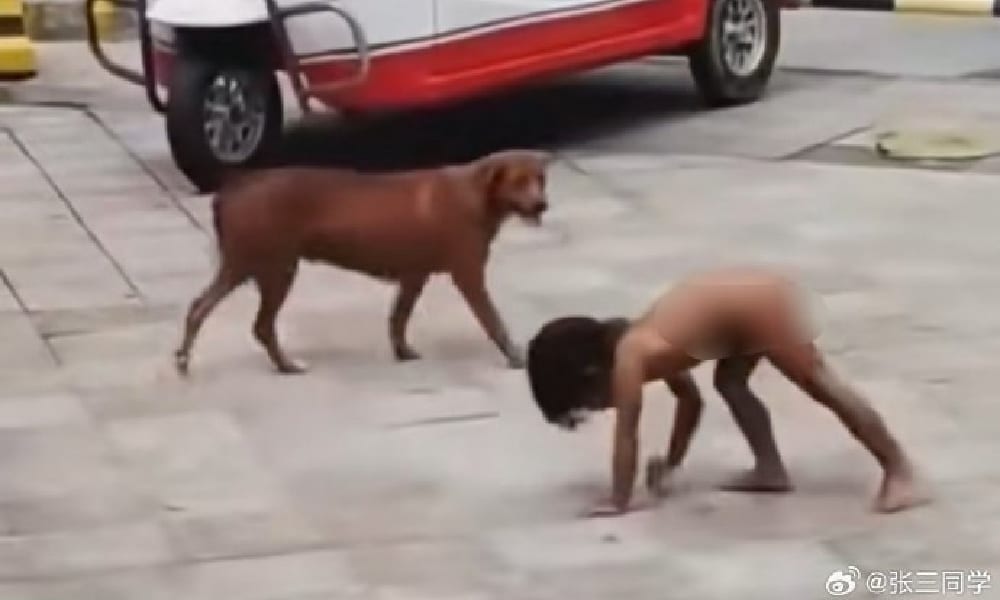
Screenshots circulating on Chinese social media showing the “wild child” in Yunnan.
A tragic and widely discussed story from Yunnan has been trending on Weibo this week, centering on a 3-year-old boy from Nanjian County who was spotted near a highway service area — naked, neglected, and walking on all fours. Online videos led Chinese netizens to dub him the “feral child.”
There have been conflicting media reports on the case over the past few days. From The First Scene (@第一现场) to Shanghai Reporter (上观新闻) some claimed the child’s parents are impoverished and jobless while others reported the father and mother are actually highly educated and do have resources, but that the choice to raise their child like this is related to lifestyle philosophy. The parents reportedly insisted that the child used to suffer from eczema and found clothes irritating and painful, so “he doesn’t like wearing clothes.”
One thing that local villagers quoted in these reports agree on is that the situation is “not normal.” The child, who never wears clothing, allegedly mimics animal behavior and refuses to eat from his hands — preferring to eat food off the ground. Locals previously already villagers reported the situation to the police.
Authorities in Nanjian County have announced the creation of a special task force to investigate this case. Officials said no signs of human trafficking were found, and that the parents are currently outside Yunnan Province. According to Beijing Youth Daily, The child and his parents are now under supervision, although it is not clear what this actually means – since other sources say the parents are not willing to cooperate. They also have another boy, who is currently one year old. Authorities have also investigating whether the parents’ behavior constitutes a crime.
Manya’s Take:
The “wild child” story brings back memories of the Xuzhou mother of eight. That heartbreaking case also gained national attention after netizens shared a video showing a woman chained up in a shed next to her family home. The chaotic media coverage of that case mirrors what we’re seeing now: media outlets are quick to jump on the story, while local authorities — feeling public anger and pressure — rush to investigate, resulting in conflicting reports, rumors, and fake news. Both situations involve rural counties that would otherwise hardly ever make headlines, with local authorities often unequipped to handle such crises quickly. Hopefully, there will be a clearer update on this story soon.
2. China Responds to Trump’s Remarks on Soybean Trade and Cooking Oil

Soybeans have been trending this week. As China is boycotting American soybeans – the fourth most sold agricultural product from the country – farmers in the US are facing uncertain times, as it’s harvesting season and the biggest purchaser of soybean exports is China.
On Tuesday, Trump wrote on Truth Social that China was “deliberately halting U.S. soybean imports,” calling it an “economically hostile act.” He also threatened to terminate business with China regarding cooking oil and other areas of trade as retribution.
On Chinese social media, people seemed unimpressed. The term TACO is also seen more often, a popular abbreviation for “Trump Always Chickens Out.” The Foreign Ministry dismissed Trump’s claims as “unfounded” and emphasized China’s commitment to normal trade relations. On Weibo, commentator Hu Xijin wrote: “Haha, so he [Trump] slaps tariffs on China and blocks chip exports and that’s not considered ‘hostile’? But when China doesn’t buy soybeans, suddenly it is? What kind of logic is that!”
Manya’s Take:
Chinese netizens are treating this latest trade exchange with irony rather than outrage, not only viewing it as a sign of US inconsistency on trade but also there’s some banter about the ‘cooking oil’ threat: when the US side talks about banning imports of “Chinese cooking oil” many assume they meant edible oil (食用油), while what the US actually imports from China is used cooking oil (UCO, 废食用油/地沟油) — waste oil that’s recycled to make biofuels. So the joke is that even Trump himself is seemingly mixing up cooking oil and used cooking oil, moreover threatening a ban that would hurt itself more than China, turning this trade spat into a moment of internet humor.
3. Nanjing Deji Plaza Faces Backlash Over VIP-Only Restrooms

The exclusive members-only restroom at Nanjing’s Deji Plaza.
Nanjing’s luxury shopping mall Deji Plaza (德基广场) has sparked controversy after introducing members-only restrooms accessible exclusively to VIP members (天象会员) who spend over 200,000 yuan ($28,000) annually. Access requires scanning a Deji membership QR code.
Beyond offering peace and privacy, the restrooms feature Tom Ford vanity sets, Jo Malone handwash, and Dyson hairdryers. One Xiaohongshu blogger (and VIP member) noted, “The maintenance cost here is ten times that of a regular restroom.”
After news of the VIP restrooms went viral, it fueled debate about turning ‘a basic human need’ into a ‘class privilege’ or “privatizing a public facility.” One user commented, “Now even restrooms have to reflect the wealth gap?”
Despite the criticism, curiosity grew — many users purchased “code-scanning services” on secondhand platforms to gain access, quickly undermining the restroom’s exclusivity. In response to the controversy, Deji Plaza stated that the members-only restrooms would soon be dismantled and converted into a regular public facility. Regardless, and despite the backlash, the initiative seems to have been fruitful in terms of brand name recognition, as it got everyone talking about Deji Plaza.
Manya’s Take:
There’s some irony in this story: there’s controversy over a mall toilet being “VIP,” yet at the same time, it’s the exclusivity that makes people want to try it. According to the latest posts on Xiaohongshu (XHS) by Deji Mall visitors, the VIP toilets are already gone, and people are back to complaining about the restrooms being too crowded and dirty. One XHS commenter (西蒙吴) had the best take on the issue: in a time when Chinese media are working to downplay the country’s wealth gap and ease public resentment, Deji Mall made the right move by dismantling the card-access VIP toilets — if not for the pressure of online public opinion, authorities might have stepped in themselves. It was an unwise move simply because it was all about a toilet: unlike VIP waiting areas or service counters, consumers don’t like restrooms being divided by class. A smarter approach would have been to create a VIP lounge that just happens to include a restroom.
4. Arc’teryx Responds to Tibet Fireworks Show Environmental Damage Investigation

The controversial fireworks show held in Tibet on September 19.
This is a topic that has sparked outrage and continued discussion in China over the past weeks. On September 19, a major fireworks event was held at an altitude of around 5,500 m or 18,000 feet in Tibet’s Himalayas, created by famous Chinese artist Cai Guoqiang (蔡国强) and sponsored by the outdoor brand Arc’teryx.
The 52-second show, titled “Ascending Dragon” (升龙) was supposed to impress people for its spectacular and colorful use of 1,050 fireworks, but it triggered outrage instead: critics blasted it as tone-deaf commercialization and ecological abuse of sacred and fragile land, and soon an investigation was launched.
Now, the outcome of that investigation has also become a major talking point as it revealed disturbance to local wildlife and caused significant environmental damage of over 30 hectares of grassland.
Cai Guoqiang and his studio will be held legally accountable for environmental damage, and Arc’teryx, as a sponsor of the event, will also bear legal responsibilities. Furthermore, the relevant county officials who had initially approved the show without going through the proper channels are also punished: Party Secretary Chen Hao (陈浩) has been dismissed, and nine other county officials received formal penalties ranging from removal to warnings.
Manya’s Take:
A lot has already been said and written about this controversy. What it comes down to, in the public perception in China, is that the high ambitions and personal goals of the artist and the Arc’teryx brand — which built its image around environmental responsibility and authentic outdoor culture — were pursued at the expense of Tibet’s fragile environment and marginalized communities. Their so-called “dreamlike” event left lasting scars for a fleeting 52-second spectacle. More than just serving as a warning for brands to ensure their actions align with their “eco-friendly” promises, this entire case will undoubtedly go down in history as a moment of awareness — a case study for future art events and large-scale performances in nature in China — on what not to do, and on how to balance spectacle with responsibility.
5. Nobel Laureate Yang Chen-ning Passes Away at 103

Yang Chen-ning passed at the age of 103.
The death of the renowned Chinese theoretical physicist Yang Zhenning (杨振宁, 1922), also known internationally as Chen-Ning Yang, China’s first Nobel laureate in physics, has been trending across Weibo, Douyin, Zhihu, and Toutiao in recent days. Yang passed away in Beijing on October 18, 2025, at the age of 103, just weeks after celebrating his birthday on October 1.
On social media, Yang is remembered as a legendary physicist who devoted his life to science and truth. He shared the 1957 Nobel Prize in Physics with Li Zhengdao (李政道) for discovering parity violation in weak interactions, and co-developed the Yang–Mills theory with Robert Mills in 1954, a cornerstone of modern particle physics.
Many online tributes also recall Yang’s lifelong friendship with nuclear physicist Deng Jiaxian (邓稼先, 1924–1986). The two met in middle school and went on to become giants of Chinese science. Yang’s wife, Weng Fan (翁帆), has also become part of the online remembrances. Over 50 years his junior, she met Yang while she was a student; they married when she was 28 and he was 82. Her tribute to Yang, expressing gratitude for having shared his company for many years, has received over 140 million views on Weibo.

Manya’s Take:
There is certainly a strong sense of national pride in the accomplishments of Yang Chen-Ning, but on social media, much of the attention also centers on his relationship with his wife, who was 54 years younger. Many see Yang’s passing as a moment of reflection — was she there for the money and fame, or for love? Opinions are divided, but the fact remains that the two were married for over twenty years, and she stayed by his side throughout. Some argue that Yang was simply so extraordinary, in both mind and body, that he naturally connected with younger people — and they with him. Others say their love was “timeless,” that true soulmates (灵魂伴侣) do not see age. Either way, it’s clear that 2025 netizens aren’t all cynics — there are quite a few romantics out there.
Spotted a mistake or want to add something? Please let us know in comments below or email us. First-time commenters, please be patient – we will have to manually approve your comment before it appears.
©2025 Whatsonweibo. All rights reserved. Do not reproduce our content without permission – you can contact us at info@whatsonweibo.com.
Subscribe
Eye on Digital China is a reader-supported publication by
Manya Koetse (@manyapan) and powered by What’s on Weibo.
It offers independent analysis of China’s online culture, media, and social trends.
To receive the newsletter and support this work, consider
becoming a paid subscriber.

Get in touch
Have a tip, story lead, or book recommendation? Interested in contributing? For ideas, suggestions, or just a quick hello, reach out here.

Signals: Hasan Piker’s China Trip & the Unexpected Journey of a Chinese School Uniform to Angola

About Eye on Digital China — Powered by What’s on Weibo

China Trend Watch: Japan Tensions, Nexperia Fallout, Yunnan’s ‘Wild Child,’ & “Modern Opium”

Eye on Digital China: How Chinese Social Media Evolved from the Blog Era to the AI-driven Age

Trump and Takaichi: The Unexpected Love Affair

The Wong Kar-wai Scandal Explained: The Dark Side of ‘Blossoms Shanghai’

From Schadenfreude to Sympathy: Chinese Online Reactions to Charlie Kirk Shooting

From Nobel Farewell to ‘VIP Toilets’: What’s Trending in China

From Tents to ‘Tangping Travel”: New Travel Trends among Young Chinese

China’s “Post Parade Afterglow”: 6 Social Media Trends
Popular Reads
-

 China Memes & Viral4 months ago
China Memes & Viral4 months agoHidden Cameras and Taboo Topics: The Many Layers of the “Nanjing Sister Hong” Scandal
-

 China Insight7 months ago
China Insight7 months agoUnderstanding the Dr. Xiao Medical Scandal
-

 China Memes & Viral11 months ago
China Memes & Viral11 months agoOur Picks: Top 10 Chinese Buzzwords and Phrases of 2024 Explained
-

 China Digital10 months ago
China Digital10 months ago“Dear Li Hua”: The TikTok/Xiaohongshu Honeymoon Explained



